|
Featured picture tools: |
These featured pictures, as scheduled below, appeared as the picture of the day (POTD) on the English Wikipedia's Main Page in March 2016. Individual sections for each day on this page can be linked to with the day number as the anchor name (e.g. [[Wikipedia:Picture of the day/March 2016#1]] for March 1).
You can add an automatically updating POTD template to your user page using {{Pic of the day}} (version with blurb) or {{POTD}} (version without blurb). For instructions on how to make custom POTD layouts, see Wikipedia:Picture of the day.Purge server cache
March 1

|
The Milkmaid is an oil painting on canvas by the Dutch artist Johannes Vermeer. Thought to have been completed c. 1657–58, it depicts a domestic kitchen maid pouring milk into a squat earthenware container. It is now in the Rijksmuseum in Amsterdam, Netherlands. Painting: Johannes Vermeer
Recently featured:
|
March 2

|
The mute swan (Cygnus olor) is a species of swan in the waterfowl family Anatidae. It is native to much of Europe and Asia and is an introduced species in North America, Australasia and southern Africa. The name "mute" derives from it being less vocal than other swan species. Measuring 125 to 170 cm (49 to 67 in) in length, this large swan is wholly white in plumage with an orange bill bordered with black. It is recognisable by its pronounced knob atop the bill, which is larger in males. Photograph: Geni
Recently featured:
|
March 3

|
An early example of a handwritten £3 Colonial banknote from the Province of North Carolina, dated 27 November 1729. The North Carolina pound was the province's currency until 1793, though valued at less than the co-circulating British pound. Banknote: Province of North Carolina; image courtesy of the National Numismatic Collection at the Smithsonian Institution
Recently featured:
|
March 4

|
|
A diagram of Jupiter showing a model of the planet's interior, with a rocky core overlaid by a deep layer of liquid metallic hydrogen and an outer layer predominantly of molecular hydrogen. Jupiter's true interior composition is uncertain. For instance, the core may have shrunk as convection currents of hot liquid metallic hydrogen mixed with the molten core and carried its contents to higher levels in the planetary interior. Furthermore, there is no clear physical boundary between the hydrogen layers—with increasing depth the gas increases smoothly in temperature and density, ultimately becoming liquid. Diagram: Kelvin Song
Recently featured:
|
March 5

|
Evening Snow on the Heater, a mid-18th century ukiyo-e print by Japanese artist Suzuki Harunobu (1725–70), displays Harunobu's mastery of the then-new polychromatic nishiki-e (or "brocade") print, as well as luxurious techniques such as extensive embossing. Painting: Suzuki Harunobu
Recently featured:
|
March 6

|
Sari is an 8th-century Buddhist temple located in Tirtomartani, Kalasan, Sleman, Yogyakarta. The building was originally two storeys with wooden beams, floors, and stairs; all organic materials are now decayed and gone. It is suggested that the original function of this building was a vihara (Buddhist monastery). Photograph: Chris Woodrich
Recently featured:
|
March 7

|
The Adonis blue (Polyommatus bellargus) is a butterfly in the family Lycaenidae found in Europe and parts of West Asia. It prefers a calcareous grassland habitat with hot and dry conditions. This specimen, a male, was photographed in Foissac, Aveyron, France. Photograph: David Iliff
Recently featured:
|
March 8

|
|
A check from the National American Woman Suffrage Association, payable to Rachel Foster Avery, which was filled out by hand by the Association's treasurer Harriet Taylor Upton and countersigned by Susan B. Anthony as president and Alice Stone Blackwell as recording secretary. NAWSA, formed on February 18, 1890, to work for women's suffrage in the United States, was formally led by Anthony between 1892 and 1900. During her presidency, the small organization focused predominantly on women's rights at the state level—much to Anthony's chagrin. It also sent delegates to the World's Congress of Representative Women at the World's Columbian Exposition. Check: Harriet Taylor Upton (image courtesy of the National Museum of American History)
Recently featured:
|
March 9

|
A juvenile pied avocet (Recurvirostra avosetta) near Oosterend, Texel Island, the Netherlands. While adults are black and white, juveniles of this species have more greyish and sepia tones. Photograph: Andreas Trepte
Recently featured:
|
March 10

|
The Kuwait Towers are a group of three slender towers in Kuwait City, standing on a promontory into the Persian Gulf. Built as part of a water distribution project, they were officially inaugurated in March 1979. Today they are rated as a landmark and symbol of modern Kuwait. The largest tower holds 4,500 cubic metres of water, a restaurant, a café, a lounge and a reception hall. The towers have been closed since March 2012 for maintenance. Photograph: Richard Bartz
Recently featured:
|
March 11

|
Hoffmann's two-toed sloth (Choloepus hoffmanni) is a species of sloth from Central and South America named for the German naturalist Karl Hoffmann. This solitary, largely nocturnal and arboreal animal, is found in mature and secondary rainforests and deciduous forests. Adults range from 54 to 72 cm (21 to 28 in) in head-body length, and weigh from 2.1 to 9 kg (4.6 to 19.8 lb). Females are larger on average than males, although with considerable overlap in size. Photograph: Geoff Gallice
Recently featured:
|
March 12

|
An illustration from Urania's Mirror (1825) depicting the constellation Lynx, with the obsolete constellation Telescopium Herschelii to its right. Lynx, introduced in the 17th century by Johannes Hevelius, is a faint constellation in the northern sky. Its brightest star, Alpha Lyncis, has an apparent magnitude of +3.13. Illustration: Sidney Hall; restoration: Adam Cuerden
Recently featured:
|
March 13

|
Wagner VI is a pseudocylindrical whole Earth map projection. It is a compromise projection, not having any special attributes other than a low-distortion appearance similar to the more common Robinson projection. The 2:1 aspect ratio of the equator to the central meridian matches their actual ratio on the Earth. Map: Strebe, using Geocart
Recently featured:
|
March 14

|
Homme au bain ("Man at His Bath") is an oil painting completed by the French Impressionist Gustave Caillebotte in 1884. The canvas measures 145 by 114 centimetres (57 in × 45 in). The painting was held in private collections from the artist's death until June 2011, when it was acquired by the Museum of Fine Arts, Boston. Interpretations of the painting and its male nude have contrasted the figure's masculinity with his vulnerability. Painting: Gustave Caillebotte
Recently featured:
|
March 15

|
A man sweeping volcanic ash in Yogyakarta during the 2014 eruption of Kelud. The East Javan volcano erupted on 13 February 2014 and sent volcanic ash covering an area of about 500 kilometres (310 mi) in diameter. Ashfall from the eruption "paralyzed Java", closing airports, tourist attractions, and businesses as far away as Bandung and causing millions of dollars in financial losses. Cleaning operations continued for more than a week. Photograph: Chris Woodrich
Recently featured:
|
March 16

|
A platoon sergeant at the Officer Candidate School at Marine Corps Base Quantico, Virginia, a base dedicated to training, educating, evaluating and screening candidates for the United States Marine Corps. In the Marines, the billet of platoon sergeant is usually held by a staff sergeant (E-6) or a gunnery sergeant (E-7), depending on the type of platoon. The sergeant's duties include taking care of the Marines and the platoon's operational control and advising the platoon commander. Photograph: John Kennicutt, U.S. Marine Corps
Recently featured:
|
March 17

|
An example of an Armenian illuminated manuscript, the Canon Table Page illuminated by Toros Roslin. The earliest surviving examples of this tradition of illuminated manuscript, which draws on both medieval Armenian art and the Byzantine tradition, date from the Golden Age of Armenian art and literature in the 5th century. This example is more recent, dating to 1256. Illumination: Toros Roslin
Recently featured:
|
March 18

|
Mary I (1516–1558) was the Queen of England and Ireland from July 1553 until her death. She is remembered for her restoration of Roman Catholicism after the short-lived Protestant reign of her half-brother, Edward VI. During her five-year reign, she had over 280 religious dissenters burned at the stake in the Marian persecutions. After her death, Mary gained the posthumous sobriquet "Bloody Mary", and Protestantism was re-established by her successor Elizabeth I. Painting: Antonis Mor
Recently featured:
|
March 19

|
Wells Cathedral, an Anglican cathedral in Wells, Somerset, as viewed from the reflecting pool in the grounds of the Bishop's Palace. The cathedral, dedicated to St Andrew the Apostle, is the seat of the Bishop of Bath and Wells. The present cathedral, built from 1175 to 1490, replaced an earlier church built on the site in 705. Its architecture is in the Gothic style, mostly the Early English Gothic of the late 12th and early 13th centuries. Photograph: Rod Ward
Recently featured:
|
March 20

|
A black-lip oyster (Pinctada margaritifera) specimen. This species of clam in the genus Pinctada is a marine bivalve mollusc that is harvested for its pearls in the Persian Gulf and southwestern part of the Indian Ocean, Fiji, Tahiti, Myanmar, Baja California, and the Gulf of Mexico. Photograph: Didier Descouens
Recently featured:
|
March 21

|
A juvenile common sandpiper (Actitis hypoleucos) in Laem Pak Bia, Petchaburi, Thailand. This Palearctic wader breeds across most of temperate and subtropical Europe and Asia, and migrates to Africa, southern Asia and Australia in winter. Photograph: JJ Harrison
Recently featured:
|
March 22

|
Perseus, named after the Greek mythological hero Perseus, is a constellation in the northern celestial hemisphere. Some star atlases during the early 19th century, such as Urania's Mirror shown here, also depicted Perseus holding onto the head of the Medusa, an asterism named Caput Medusae. The constellation is located near several others named after ancient Greek legends surrounding Perseus, including Andromeda to the west and Cassiopeia to the north. Illustration: Sidney Hall; restoration: Adam Cuerden
Recently featured:
|
March 23

|
Holy Trinity is an Anglican parish church in London, built in 1888–90 on the south-eastern side of Sloane Street to an Arts and Crafts design by the architect J. D. Sedding. Funded by the 5th Earl Cadogan, in whose estate it lay, the church replaced an earlier building only half its size which, at the time of its demolition, was less than sixty years old. Holy Trinity was heavily damaged during World War II but restored by the 1960s. Photograph: David Iliff
Recently featured:
|
March 24
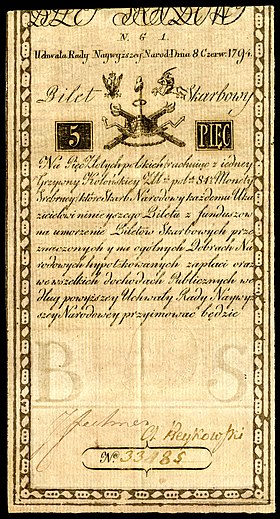
|
A five-złoty banknote, issued by the Polish–Lithuanian Commonwealth on 8 June 1794 under the authority of Tadeusz Kościuszko. This issue, which also included denominations of 10, 25, 50, 100, 500, and 1,000 złotych, marked the currency's first use of banknotes; złoty coins had been in use since the fifteenth century. See other denominations. Banknote: Kingdom of Poland; image courtesy of the National Numismatic Collection at the Smithsonian Institution
Recently featured:
|
March 25
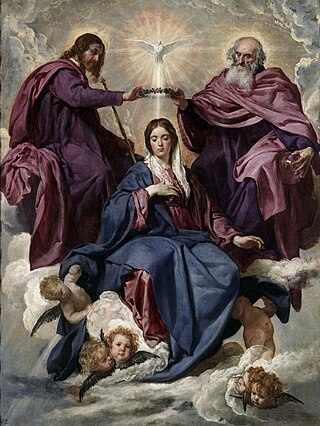
|
Coronation of the Virgin is an oil painting on canvas completed by Diego Velázquez between 1641 and 1644. Depicting the Holy Trinity crowning the Blessed Virgin Mary, it may have been commissioned for the oratory of the court of Elisabeth of France, queen consort to Philip IV of Spain, in the Real Alcázar of Madrid. The painting is presently held by the Museo del Prado. Painting: Diego Velázquez
Recently featured:
|
March 26
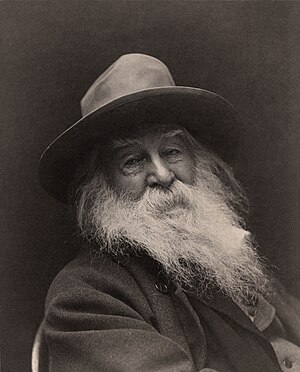
|
Walt Whitman (1819–1892) was an American poet, essayist and journalist. A humanist, he was a part of the transition between transcendentalism and realism, incorporating both views in his works. Whitman is among the most influential poets in the American canon, often called the father of free verse. His work was very controversial in its time, particularly his poetry collection Leaves of Grass (first published in 1855, but continuously revised until Whitman's death), which was described as obscene for its overt sexuality. Photograph: George C. Cox; restoration: Adam Cuerden
Recently featured:
|
March 27

|
Young Hare is a 1502 watercolour and bodycolour painting by German artist Albrecht Dürer. Painted in 1502 in his workshop, it is acknowledged as a masterpiece of observational art alongside his Great Piece of Turf from the following year. The subject is rendered with almost photographic accuracy, and although the piece is normally given the title Young Hare, the portrait is sufficiently detailed for the hare to be identified as a mature specimen. The painting is now held in Albertina, Vienna. Painting: Albrecht Dürer
Recently featured:
|
March 28
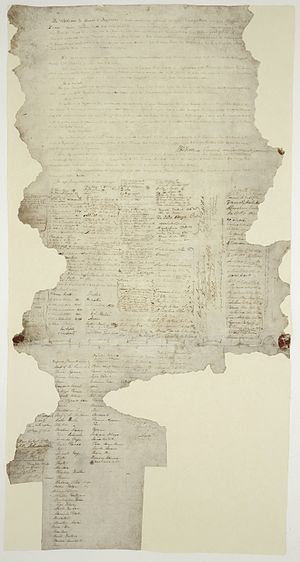
|
One of nine extant copies (all damaged by water and rodents while in storage) of the Waitangi sheet of the Treaty of Waitangi, first signed on 6 February 1840 by representatives of the British Crown and various Māori chiefs from the North Island of New Zealand. Consequently, Lieutenant Governor William Hobson declared British sovereignty over New Zealand in May 1840. The treaty also established a British Governor of New Zealand; recognised Māori ownership of their lands, forests, and other properties; and gave the Māori the rights of British subjects. In return the Māori people ceded New Zealand to Queen Victoria, giving her government the sole right to purchase land. Owing to significant difference in the English and Māori versions, there was no consensus regarding governance. The courts long ignored the treaty, but in 1975 the Waitangi Tribunal was established as a permanent commission of inquiry tasked with researching British breaches of it, and suggesting means of redress. Document: William Hobson, James Freeman, and James Busby (English version); Henry Williams and Edward Williams (Māori translation)
Recently featured:
|
March 29

|
|
All earthworms have bodies composed of repeated segments called metameres separated from one another by circular membranes called septa. The metameres are very similar to one another, but in earthworms there are the following variations (among others): there are no nephridia in the first three segments; there are no nerve ganglia in the first two segments (though several nerves extend there from the third and fourth segments); the prostomium, which is not a complete segment, functions as a flap to close the mouth but is also highly flexible and is used by the worm as a prehensile body part to grasp and pull leaves and grass into its burrow. The large muscular pharynx sucks in the worm’s food which then passes between the animal’s hearts to be stored and moistened in the crop and then ground by fragments of ingested sand and stone in the gizzard before entering the rest of the intestine. The gizzard is considered the animal’s stomach. The nephridia are the only waste-filtering organs—there is no separate digestive gland or liver. Diagram: K.D. Schroeder
Recently featured:
|
March 30

|
SMS Fürst Bismarck was Germany's first armored cruiser, built for the Kaiserliche Marine before the turn of the 20th century and launched in 1900. Named for the German statesman Otto von Bismarck, the ship was primarily intended for colonial duties. She served in this capacity as part of the East Asia Squadron until she was relieved in 1909, at which point she returned to Germany. The ship was rebuilt between 1910 and 1914, and after the start of World War I, she was briefly used as a coastal defense ship. She proved inadequate to this task, and so she was withdrawn from active duty and served as a training ship for engineers until the end of the war. Fürst Bismarck was decommissioned in 1919 and sold for scrap. Illustration: Hugo Graf; restoration: Adam Cuerden
Recently featured:
|
March 31
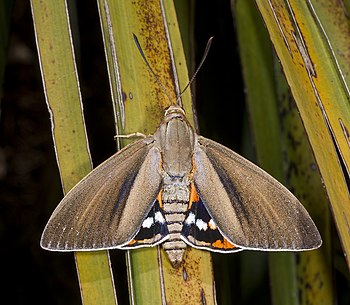
|
Paysandisia archon is a large moth of the family Castniidae. Native to Uruguay and central Argentina, it has been accidentally introduced to Europe. Females are generally larger than males, and moths of both sexes fly by day. As with other members of their family, these moths are easily mistaken for butterflies. Photograph: Didier Descouens
Recently featured:
|
Picture of the day archives and future dates